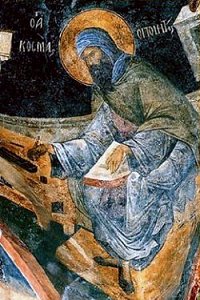Introduction
Died: Circa 760.

Died: Circa 760.

S. Cosmas of Jerusalem holds the second place amidst Greek Ecclesiastical poets.
Left an orphan at an early age, he was adopted by the father of S. John Damascene; and the two foster-brothers were bound together by a friendship which lasted through life.
They excited each other to Hymnology, and assisted, corrected, and polished each other’s compositions.
Cosmas, like his friend, became a monk of S. Sabas: and against his will was consecrated Bishop of Maiuma, near Gaza, by John, Patriarch of 128 Jerusalem; the same who ordained S. John Damascene Priest.
After administering his diocese with great holiness, he departed this life in a good old age, about 760, and is commemorated by the Eastern Church on the 14th of October.
Where perfect sweetness dwells
Is Cosmas gone;
But his sweet lays
To cheer the Church live on.
Says the stichos prefixed to his life.
His compositions are tolerably numerous, and he seems to have taken a pleasure in competing with S. John Damascene, as in the Nativity, the Epiphany, the Transfiguration, where the Canons of both are given.
To Cosmas, a considerable part of the Octoechus is owing.
The best of his compositions, besides those already mentioned, seem to be his Canons on S. Gregory Nazianzen, and the Purification.
He is the most learned of the Greek Church poets: and his fondness for types, boldness in their application, and love of aggregating them, make him the Oriental Adam of S. Victor.
It is owing partly to a compressed fullness of meaning, very uncommon in the Greek poets of the Church, partly to the unusual harshness and contraction of his phrases, that he is the hardest of ecclesiastical bards to comprehend.
John Mason Neale, Hymns of the Eastern Church (London: J. T. Hayes, 1862)
If you know Cosmas’ burial place,